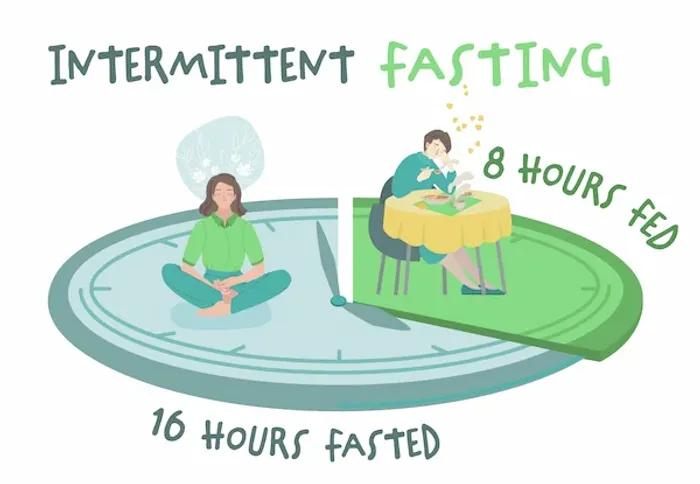Guide to Intermittent Fasting
Discover why a fertility assessment is the crucial first step in your parenthood journey. Learn how fertility tests help identify underlying issues early and guide personalized treatment options for better outcomes.

Written by Dr. Dhankecha Mayank Dineshbhai
Reviewed by Dr. D Bhanu Prakash MBBS, AFIH, Advanced certificate in critical care medicine, Fellowship in critical care medicine
Last updated on 13th Jan, 2026

Introduction
Have you ever wondered if when you eat is just as important as what you eat? This question is at the heart of intermittent fasting (IF), one of the world's most popular health and fitness trends. Unlike traditional diets that focus on restricting specific food groups, intermittent fasting is uniquely centered on when you consume your calories. It cycles between periods of eating and voluntary fasting, tapping into your body's innate biological pathways. People are turning to IF not just for weight loss, but for a host of potential health benefits, from improved brain function to enhanced cellular repair. But with so much information available, it can be confusing to know where to start. Is it safe? What method works best? This comprehensive guide will demystify intermittent fasting, exploring the science behind it, outlining the most effective schedules, and providing a safe, practical roadmap for beginners. We’ll equip you with everything you need to determine if this powerful eating pattern is the right fit for your lifestyle and health goals.
What Exactly is Intermittent Fasting?
It’s an Eating Pattern, Not a Diet
The most important concept to grasp is that intermittent fasting is not a diet in the conventional sense. It doesn't prescribe which foods to eat but rather when you should eat them. It's best described as an eating pattern. Think of it as scheduling your meals into specific time windows throughout the day or week. During the fasting periods, you abstain from consuming calories, though water, black coffee, and tea are generally permitted. This approach is often easier for people to follow than complex diets because it simplifies daily decisions—you don't need to count calories or macros during your eating window (though food quality still matters). This focus on timing makes intermittent fasting a sustainable lifestyle change for many.
The Science Behind the Fast: Switching Fuel Sources
To understand why IF works, we need to look at what happens inside your body when you fast. After you eat, your body spends hours processing that food, burning the energy it just received. Because it has easy access to energy from your last meal, it primarily uses glucose (sugar) for fuel and stores the excess in your liver as glycogen. Insulin levels are high during this time to shuttle glucose into your cells.
When you fast, this process reverses. Insulin levels drop significantly, signaling your body to start burning stored energy. After about 12 hours of fasting, your liver glycogen stores become depleted. This is when your body begins to break down fat for energy, a process that produces molecules called ketones. This metabolic switch from sugar-burning to fat-burning is a key driver behind the weight loss and energy stability associated with intermittent fasting. This state also triggers other important cellular processes, like autophagy.
Top Intermittent Fasting Methods Explained
There isn't a one-size-fits-all approach to intermittent fasting. Different methods suit different lifestyles. Here are the most popular intermittent fasting schedules:
The 16:8 Method (The Most Popular)
The 16:8 method involves fasting every day for 16 hours and restricting your daily eating window to 8 hours. For most people, this is the most manageable form of time-restricted eating. For example, you might eat your first meal at 12:00 PM and finish your last meal by 8:00 PM. This schedule often simply means skipping breakfast and avoiding late-night snacks. Its popularity stems from its ease of integration into a daily routine, making it an excellent choice for intermittent fasting for beginners.
The 5:2 Diet
This approach involves eating normally for five days of the week while significantly restricting your calorie intake on the other two, non-consecutive days. On the two fasting days, the recommendation is to consume only about 500-600 calories. For instance, you might eat normally from Monday to Friday, then consume a very light meal (e.g., a small salad and a portion of lean protein) on Tuesday and Thursday. This method appeals to those who don't want to monitor their eating daily.
Eat-Stop-Eat (24-Hour Fast)
Popularized by fitness expert Brad Pilon, this method involves a full 24-hour fast once or twice a week. For example, you might finish dinner at 7:00 PM on a Monday and then not eat again until 7:00 PM on Tuesday. During the fast, you can drink non-caloric beverages. While effective, this method can be challenging due to potential hunger and fatigue, and it may not be suitable for everyone.
Alternate-Day Fasting
As the name implies, this pattern alternates between days of normal eating and days of fasting. Some versions allow for about 500 calories on fasting days. While research has shown it can be effective for weight loss, the frequency of fasting days makes it one of the more difficult methods to maintain long-term.
Consult an General Physician
Proven Benefits of Intermittent Fasting
The benefits of intermittent fasting extend far beyond the scale. Research has linked this eating pattern to numerous positive health outcomes.
Weight Loss and Belly Fat Reduction
By creating a natural calorie deficit and enhancing hormone function to facilitate weight loss, IF is a powerful tool for shedding pounds. The drop in insulin levels increases fat burning, and the shorter eating window often leads to reduced overall calorie intake without conscious restriction. Studies have particularly noted a reduction in harmful visceral belly fat, which is linked to metabolic disease.
Improved Insulin Sensitivity and Blood Sugar Control
Intermittent fasting can have profound benefits for insulin resistance. By giving your body prolonged breaks from sugar spikes, it helps lower blood sugar levels and improves insulin sensitivity. A study published in the journal Cell Metabolism found that an intermittent fasting schedule led to improved insulin stability in participants, which is crucial for preventing Type 2 diabetes.
Cellular Repair and Autophagy
This is one of the most exciting areas of research. Autophagy is the body's internal "housekeeping" process, where cells digest and remove old, dysfunctional proteins that build up inside them. Fasting triggers autophagy, which may help protect against several diseases, including cancer and Alzheimer's, and promote longevity. Think of it as a cellular reset button.
Potential Benefits for Heart and Brain Health
IF may improve numerous risk factors for heart disease, such as blood pressure, cholesterol levels, and inflammatory markers. For the brain, it increases the production of a protein called brain-derived neurotrophic factor (BDNF), which supports the health of nerve cells and may protect against depression and other brain disorders.
Potential Side Effects and Who Should Be Cautious
While powerful, intermittent fasting isn't for everyone, and it's important to be aware of potential drawbacks.
Common Short-Term Side Effects
When you first start, it's normal to experience hunger, irritability, low energy, and possibly headaches as your body adapts to its new fuel schedule. These side effects are usually temporary and subside within a week or two as your body becomes fat-adapted. Staying well-hydrated and ensuring you get enough electrolytes can help mitigate these symptoms.
Groups Who Should Avoid Intermittent Fasting
Certain individuals should not practice IF without direct medical supervision. This includes:
Pregnant or breastfeeding women: They require a steady stream of nutrients.
Individuals with a history of eating disorders: The restrictive pattern can trigger unhealthy behaviors.
People with diabetes or blood sugar problems: Fasting can cause dangerous fluctuations in blood sugar levels. If you have diabetes and are considering a significant change to your eating pattern, it is crucial to consult a doctor online with Apollo24|7 to create a safe and monitored plan.
Those who are underweight or have nutrient deficiencies.
Individuals with chronic stress or adrenal fatigue.
If you experience persistent dizziness, severe fatigue, or other concerning symptoms, it's a sign to stop and re-evaluate. If your condition does not improve after trying these methods, book a physical visit to a doctor with Apollo24|7 to rule out any underlying issues.
How to Start Intermittent Fasting Safely?
Ready to give it a try? Follow these steps for a smooth and safe start.
Step 1: Choosing the Right Method for Your Lifestyle
Don't jump into the most extreme method. Start with the simplest, like the 16:8 protocol. If 16 hours feels too long, begin with a 14-hour fast (e.g., 7:00 PM to 9:00 AM) and gradually increase the fasting window. Consistency is more important than intensity.
Step 2: What to Eat During Your Eating Window
Intermittent fasting is not a license to eat junk food. To reap the full benefits, focus on nutrient-dense whole foods during your eating window. Prioritize:
Protein: Chicken, fish, eggs, legumes.
Healthy Fats: Avocado, nuts, olive oil.
Fiber-rich Carbs: Vegetables, fruits, whole grains.
This combination will keep you full and satisfied until your next eating window.
Step 3: Staying Hydrated is Non-Negotiable
During your fast, drink plenty of water. Herbal tea, black coffee, and sparkling water are also great options. Hunger is often mistaken for thirst, so staying hydrated can help manage hunger pangs.
Step 4: Listening to Your Body
This is the most crucial step. Pay attention to how you feel. Some people thrive on IF, while others may find it increases their stress levels. It's a tool, not a religion. Be flexible and adjust as needed.
Conclusion: Is Intermittent Fasting Right for You?
Intermittent fasting is a powerful and flexible dietary strategy that can offer significant benefits for weight management and overall metabolic health. By harnessing your body's natural cycles, it can simplify your life while promoting fat loss, improving blood sugar control, and encouraging cellular cleanup. However, its success hinges on a personalized approach. What works for one person may not work for another. The key is to start slowly, choose a method that aligns with your lifestyle, prioritize whole foods, and, most importantly, listen to the signals your body is sending you. If you have any pre-existing health conditions, seeking professional guidance is essential. Apollo24|7 offers a convenient home collection for tests like vitamin D or HbA1c, which can help you and your doctor establish a baseline before and during your IF journey. Ultimately, intermittent fasting is a tool—one that, when used wisely, can be a sustainable path to better health.
Consult an General Physician
Consult an General Physician

Dr. Rajib Ghose
General Physician/ Internal Medicine Specialist
25 Years • MBBS
East Midnapore
VIVEKANANDA SEBA SADAN, East Midnapore

Dr Vinay Kumar A V
Nephrologist
8 Years • MBBS, MD - General Medicine, DM - Nephrology
Bilaspur
Apollo Hospitals Seepat Road, Bilaspur

Dr. Hariprasath J
General Physician/ Internal Medicine Specialist
19 Years • MD (Gen Med), FCCP, Dip (Diabetology, UK)
Chennai
Apollo First Med Hospitals P H Road, Chennai
(225+ Patients)

Dr. Tanmaya Kumar Sahu
General Physician/ Internal Medicine Specialist
12 Years • MBBS, MD ( Internal Medicine )
Bhubaneswar
Apollo Hospitals Old Sainik School Road, Bhubaneswar
(25+ Patients)

Dr. Rohit Basu
General Practitioner
8 Years • MBBS, DNB (General surgery)
East Midnapore
VIVEKANANDA SEBA SADAN, East Midnapore
More articles from Weight Loss Non Surgical
Frequently Asked Questions
1. Can I drink coffee during the fasting window?
Yes, you can drink black coffee, tea, and other non-caloric beverages during your fast. Adding sugar, milk, or cream will break your fast as it triggers an insulin response.
2. Will intermittent fasting cause muscle loss?
Any weight loss strategy can lead to some muscle loss, but IF, particularly when combined with resistance training and adequate protein intake during your eating window, has been shown to preserve muscle mass effectively compared to standard calorie restriction.
3. What is the best way to break a fast?
It's best to break your fast with a balanced meal containing protein, healthy fats, and fiber. Avoid breaking a fast with a large, sugar-heavy meal, as this can cause a rapid spike in blood sugar and insulin, leading to energy crashes.
4. How long does it take to see results from intermittent fasting?
This varies by individual and your goals. Some people notice improved energy and reduced bloating within the first week. Significant weight loss results typically become apparent after several weeks of consistent practice.
5. Are the benefits of intermittent fasting for women the same as for men?
Women can benefit from IF, but they may be more sensitive to signals of starvation due to their role in reproduction. Some women find that longer or more intense fasts disrupt their hormones. It's often recommended that women start with a more moderate approach, like 14:10, and be mindful of their cycle.

